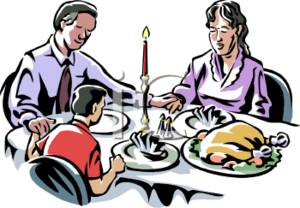Family Dinner
Posted in Family, Parenting on 01/17/2011 10:08 pm by CCHow many times per week does your family have dinner together? With busy work and activity schedules, it can be difficult to sit face-to-face with everyone each night of the week. However, having dinner with your family creates memories that can last a lifetime.

I’m the super silly one in my house, so antics like kicking my husband (gently) under the table, making funny faces, and saying long prayers while everyone eagerly waits to dive into dinner lightens the mood for an event that could sometimes seem too formal for children.
I love having dinner with my family, because it allows us to spend undivided time together to discuss what’s on our minds, and pray together. Speaking of praying, one tradition that we established is for one person at the table to give thanks, offer praises, and pray for the needs of our family as well as those of
 others. We work our way around the table until we begin the rotation again six days later (we’re a family of six). Another tradition that we tried was to for each person present to compliment someone else at the table. Initially, we tried to do that for every person every night. Needless to say with six people having to compliment five other people each night, dinner was cold by the time we were done.
others. We work our way around the table until we begin the rotation again six days later (we’re a family of six). Another tradition that we tried was to for each person present to compliment someone else at the table. Initially, we tried to do that for every person every night. Needless to say with six people having to compliment five other people each night, dinner was cold by the time we were done.
How to Make Meals Enjoyable
- Ask about each other’s day
- Get input from each member of the family for meal plans
- Ignore the telephone and turn off the television
- Keep your meals simple and save the multi-course meals for the holidays
- Save serious topics of discussion for family meetings
- Set mood music; in our house, it’s Christian music
Family meals are believed to positively impact your children’s grades, bring about lower levels of stress, instill better table manners, and encouraghealthy eating habits. So why not begin the tradition of family meals in your household today?
Let’s chat!
Love to all!
CC




